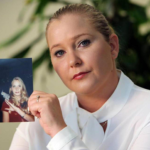Introduction
In a striking symbol of shifting diplomacy, Donald Trump’s close ally and real estate mogul Steve Witkoff met with Russian President Vladimir Putin for the fourth time in just over two months. With smiles and handshakes in the Kremlin, the billionaire businessman is now the face of an unconventional U.S.-Russia backchannel, raising eyebrows and concerns across Europe and Ukraine.

Unorthodox Diplomacy in the Trump Era
Steve Witkoff is no seasoned diplomat. Known for his business deals and longtime friendship with Donald Trump, Witkoff has stepped into an unofficial but high-profile role as a negotiator with the Kremlin. His meetings with Putin have sparked speculation about the Trump campaign’s foreign policy direction ahead of the 2024 U.S. presidential election.
Power Imbalance at the Kremlin Table
In Kremlin footage released to the public, Putin was joined by key aides—including foreign policy veteran Yuri Ushakov and sovereign investment chief Kirill Dmitriev—while Witkoff sat across with only a translator. The optics underscored the asymmetry in formal diplomatic weight, yet also revealed how far the Trump team is willing to lean into informal channels for high-stakes talks.
Ukraine Peace Talks: What’s on the Table?
Little has been publicly confirmed about what was discussed, but sources suggest the talks centered on possible terms for peace in Ukraine. Leaked proposals hint at deep divides over territorial concessions, sanctions relief for Moscow, and the sequencing of commitments. During a post-meeting call, Ushakov avoided questions about these obstacles, abruptly ending the call when asked about Ukraine.
Kyiv and Europe Left Out
The exclusion of Ukrainian and European representatives from these talks has raised concerns in Kyiv. Officials fear the U.S. may pressure Ukraine into an unfavorable settlement, particularly if Trump returns to power. The killing of a senior Russian general, Yaroslav Moskalik, in a car bombing near Moscow on the same day further illustrates the high-stakes tension surrounding these discussions.
Symbolic Shifts: From Adversaries to Allies?
On the sidelines of these meetings, Moscow held a ceremony marking 80 years since U.S. and Soviet troops met on the Elbe River in WWII. The event, attended by both Russian and American figures, echoed a bygone era of alliance. Russian officials, including Foreign Ministry spokesperson Maria Zakharova, framed current diplomacy as a reset—blaming the “previous American administration” for the war’s escalation.
Trump’s Blame Game and Biden’s Waning Influence
Donald Trump has repeatedly criticized Ukrainian President Volodymyr Zelensky, recently stating, “You don’t start a war against someone 20 times your size.” The comments reflect a stark contrast with President Biden’s earlier pledge to support Ukraine “as long as we can.” With elections nearing, U.S. foreign policy could be poised for a radical turn.
Conclusion
Steve Witkoff’s repeated visits to the Kremlin mark a dramatic shift in U.S.-Russia diplomacy. As Trump allies engage in peace talks behind closed doors, the future of the Ukraine war and broader global security hangs in the balance. Whether this informal approach leads to resolution or deeper division remains to be seen—but what’s clear is that the rules of diplomacy are changing fast.
Related Reading: U.S. Lawmakers Clash Over Ukraine War Strategy









